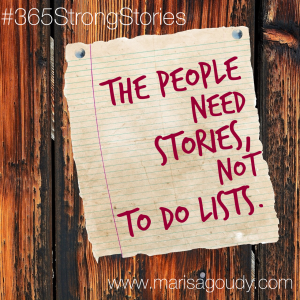
BLOG
The People Need Stories, Not To Do Lists
 The difference between telling a strong story and writing “just another blog post”
The difference between telling a strong story and writing “just another blog post”
There are million different ways to approach a topic. Say you wanted to write about how to talk with your partner about a struggles a creative entrepreneur.
You could use the good old “people love list posts” approach:
Seven ways you “should” approach the situation including “make a spreadsheet that he can understand!” and “make sure everyone is well-rested and ready to fully engage in the conversation.”
If your readers are worrying about how to get their partner to be more supportive of a business venture, they just might come away with a tip that helps them along.
But then there’s the storytelling approach:
It’s one a.m. when she gets to bed. She’s chilled from sitting at the computer for so long and feels so grateful when he entangles his sleep warmed limbs with hers. Visions of Facebook ads and YouTube clips swim before her eyes as she tries desperately to sleep. The kids will be up soon and there’s so much more work to do to get this new course launched.
He knows the pattern of her breath. He knows it doesn’t mean anything good. “Did you get everything done?” he asks. When she snorts, he asks, “Did you get at least one thing done? Are you upset?
“Yes. And yes.” She starts to cry because finishing up a LeadPage doesn’t feel like much when the to do list stretches across so many notebook pages.
She is not ok. She is tired and she is scared and she is so desperate for all of her work to pay off.
It would have been easy to mumble “it’s all good” and roll over to feed her fears into the lonely darkness. Instead, she chose to be honest. She chose to speak her truth and ask her husband for the kind of help that only he can give - to listen to her in the darkness and make the world feel safe again.
Though they’ll both be exhausted in the morning, there’s one less brick in the wall between them. There’s space for sunshine and support and connection to flow in their marriage, in her business, and in their bank account.
This is why storytelling works
Because it’s a story, the reader connects with you in a real way that builds trust. They get drawn in by the emotion. Even if they’re not looking for “quick and easy tips for having tough conversations with your spouse about your business,” people who understand the challenges of entrepreneurship will be drawn in.
Stories are like giant magnets for the brain - people want to be invited into the room, into the conflict, and into the resolution. A story like this one shows them they’re not alone and exposes the other side of “grow your six figure online business” sales pitches.
How to make storytelling work for you, your audience, and your business
Is that my story above? Well, I can tell you that I am launching a new course and I’m pretty sleepy today…
That’s not the point of all this, though. My goal is to help you understand that stories are what connect you with your readers and with your potential clients.
We dive deep into why we need stories and list posts in the Connect With Your Readers & Clients: Discover the Story Triangle webinar. The recording will be available through Monday, April 11.
